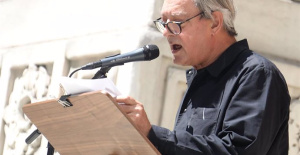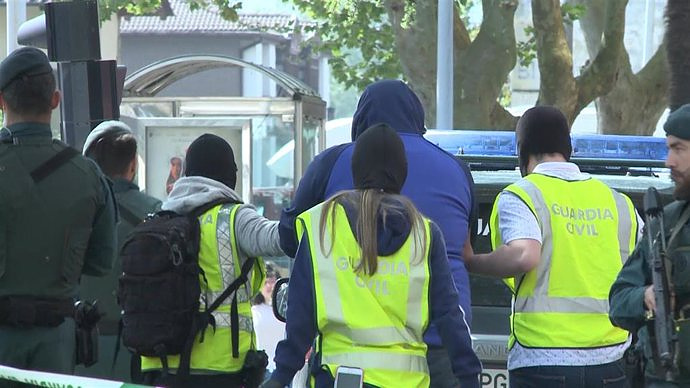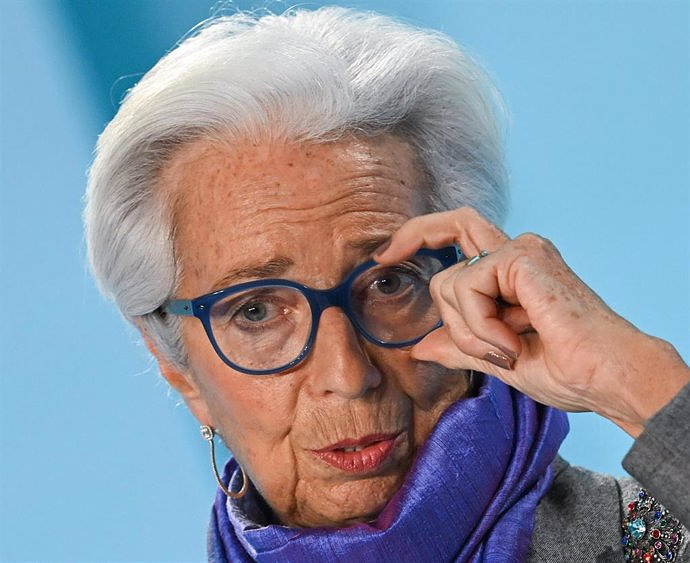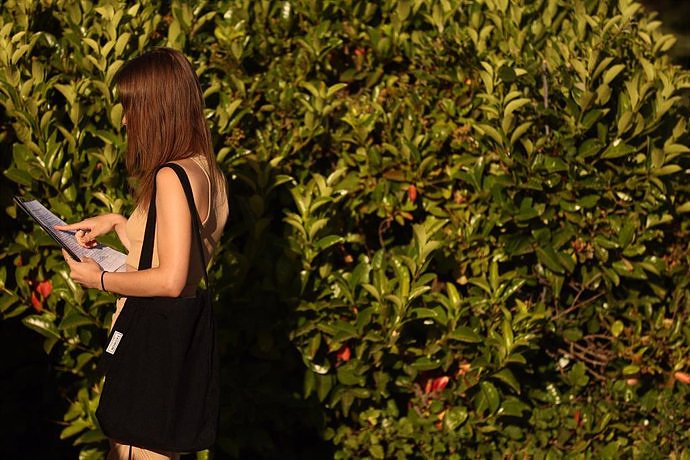The majority are men between 18 and 35 years old and 25% had a criminal record, according to a study by the Elcano Royal Institute MADRID, Mar 3. (EUROPA PRESS) -
The profile of jihadists arrested or killed in action in Spain has evolved in the 20 years since the 11-M attacks in Madrid and, although they are still mostly men between 18 and 35 years old, women now represent almost 12% and 10% are converts and not Muslims by birth. Furthermore, half are Moroccan but indigenous or Spanish jihadism is increasing due to the growing presence of second generations.
This is clear from the study prepared by the Elcano Royal Institute in which the data of the 195 jihadists convicted in the period between 2012 and 2023 in Spain and the ten who died in action have been analyzed - the eight from the Ripoll cell who committed the attacks in Barcelona and Cambrils as well as the authors of the attacks in Cornellá (Barcelona) and Torre Pacheco (Murcia), and consulted by Europa Press.
In general, these are men between 18 and 35 years old at the time of being arrested or dying, both married (five out of ten) and single (four out of ten) and often with previous careers as criminals, a very similar profile. to that observed in other European countries. The predominance of men "is especially due to a very fundamentalist and violent way of understanding Islamic law."
However, if between 2001 and 2011 there were no cases of women, today they constitute 11.7% of the cases of detainees or deaths. This change is explained "largely to a specific campaign for mobilization developed especially by the Islamic State while it maintained its caliphate over the territories of Syria and Iraq," explains the study.
Specifically, of the 205 cases analyzed, 24 are women, of whom all but one were radicalized during the cycle of mobilization linked to the war in Syria and the emergence of the Islamic State as a reference organization, between 2012 and 2015 essentially. The remaining woman became involved alone starting in 2020. None of them have performed operational functions or been trained in the use of weapons or explosives, as is the case in 69.6% of male cases.
In this sense, their work has been for proselytizing purposes and to exalt their organization (62.5%) or for the recruitment and radicalization of women (50%), while 12.5% have carried out logistical functions and 10 .7% financing. Furthermore, eight out of ten were willing to move to the 'caliphate', 66.7% of them to actively contribute as wives and mothers, responsible for the vertical transmission of jihadist values to the next generation.
But without a doubt the great change observed is in the origin of the jihadists convicted or killed in Spain in the last decade. Six out of ten are born in Morocco (55.9%) and five out of ten have Moroccan nationality (48%), a difference that lies in the fact that some have become naturalized as Spanish, although technically they have not lost their nationality. Moroccan.
In the previous decade, those born in Morocco were 32.2%, while 20.2% had Algeria as their country of birth, 19% Pakistan and 14.3% Syria. These three countries currently represent 5.4%, 1% and 1%, respectively. In terms of nationality, Algerians only make up 4.9% (compared to 20.2%), Pakistanis 0.5% (compared to 17.8%) and Syrians 0.5% (compared to 6%).
These data, highlights the document consulted by Europa Press, "reveal the extent to which global jihadism, in Spain, is projected from Morocco" something that is explained by the geographical proximity, which means that there is a significant community of Moroccan immigrants. Furthermore, he specifies, "Morocco is a country markedly affected by global jihadism from the very origins of this phenomenon."
All this is compatible with the fact that a quarter were born in Spanish territory (27.2%) and that almost four out of ten have Spanish nationality (38.7%). According to Elcano, the latter is "three times more due to origin than due to naturalization. As a result, "the second major component of global jihadism in Spain is the autochthonous or Spanish one." "We are no longer facing a phenomenon emanating almost exclusively from abroad, as happened between 2001 and 2011," he warns.
There has also been a change here. If in the previous decade the jihadists who were first generation immigrants were the majority (78.2%) compared to the second generations (19.2%), now the latter are the most numerous (52.1%) compared to those of first generation (35.9%) and there are even cases of third generations (7.1%). In addition, those who did not have ancestors of foreign migration have increased, going from 2.6% to 7.1%.
Thus, endogenous jihadism in Spain would already represent 64.1% of the cases if second generations, third generations and those who do not have immigrant ancestors are added. "The emergence of this 'homegrown' jihadism in Spain has occurred concurrently with the jihadist mobilization" that occurred worldwide with the war in Syria and the emergence of the Islamic State and that particularly affected Muslim communities in European countries. Western.
In general, both in Spain and in these countries, these are "adolescents and young people who live in a complicated balance between cultures and norms, prone to identity crises, in environments in which families and places of worship are suitable for resolving these tensions." in an integrative sense, which is why they sometimes believe they find answers and meaning in the attitudes and beliefs of jihadist Salafism," the report summarizes.
On the other hand, a certain rejuvenation can be seen in the last decade compared to the previous one since although those between 18 and 35 years old are the majority (seven out of ten), now there are also cases of minors (1% of 14 or less years old and 4.9% between 15 and 17 years old). At the same time, the oldest age group, 51 years and older, also registers a slight increase (going from 3.6 to 5.4%).
In another vein, the study confirms that although Muslims of origin are the majority, currently one in ten cases is a convert (between 2001 and 2011 they were 3.6%). Among them there are those who "came to jihadism from the Islamization of a previous radicalism of disparate ideological orientations" as well as "young people who grew up in broken families and who have gone through difficult periods of adolescence, often with traumatic experiences and problems." behavior or mental health.
One fact that has not changed significantly is that of those who had a previous criminal record. Thus, now they are 25.7% while in the period 2001-2011 they were 26.8%. These individuals transfer their skills and experience and their previous familiarity with the use of violence makes them adapt relatively more easily to the use of terrorism, highlights the Elcano study.
Crimes against property predominate, often robberies with violence (55.2%); crimes against people, especially attempted murder, injuries or attacks against a law enforcement agent (41.4%) and crimes related to illicit drug trafficking (31%), although there is also 13.8% for crimes of mistreatment common in the family environment.
By region, Catalonia continues to be the one with the highest presence of cases of jihadism (35.8%), with Madrid with 15.3%, followed by Ceuta (10%), Melilla (8.4%), Andalusia ( 7.4%), Valencian Community (6.3%) and Basque Country (5.3%).

 Exploring Cardano: Inner Workings and Advantages of this Cryptocurrency
Exploring Cardano: Inner Workings and Advantages of this Cryptocurrency Seville.- Economy.- Innova.- STSA inaugurates its new painting and sealing hangar in San Pablo, for 18 million
Seville.- Economy.- Innova.- STSA inaugurates its new painting and sealing hangar in San Pablo, for 18 million Innova.- More than 300 volunteers join the Andalucía Compromiso Digital network in one month to facilitate access to ICT
Innova.- More than 300 volunteers join the Andalucía Compromiso Digital network in one month to facilitate access to ICT Innova.-AMP.- Ayesa acquires 51% of Sadiel, which will create new technological engineering products and expand markets
Innova.-AMP.- Ayesa acquires 51% of Sadiel, which will create new technological engineering products and expand markets Prominent American writer Paul Auster dies at 77 from lung cancer
Prominent American writer Paul Auster dies at 77 from lung cancer RELEASE: Rendeavor Expands High-Speed Internet Access to Local Communities Around Tatu, Kenya
RELEASE: Rendeavor Expands High-Speed Internet Access to Local Communities Around Tatu, Kenya Real Madrid saves a draw in Munich and will appeal again to the Bernabéu
Real Madrid saves a draw in Munich and will appeal again to the Bernabéu The Congress of Argentina approves the omnibus law that allows the privatization of some public companies
The Congress of Argentina approves the omnibus law that allows the privatization of some public companies How Blockchain in being used to shape the future
How Blockchain in being used to shape the future Not just BTC and ETH: Here Are Some More Interesting Coins Worth Focusing on
Not just BTC and ETH: Here Are Some More Interesting Coins Worth Focusing on Valencia unanimously approves the ordinance to allocate spaces to test innovative initiatives
Valencia unanimously approves the ordinance to allocate spaces to test innovative initiatives UPV researchers promote a paid master's degree as a "talent factory" in integrated photonics
UPV researchers promote a paid master's degree as a "talent factory" in integrated photonics A spin-off of the UV works on obtaining high-resolution 3D biomedical images in real time
A spin-off of the UV works on obtaining high-resolution 3D biomedical images in real time They create a bank of machinery sounds to prevent breakdowns through artificial intelligence
They create a bank of machinery sounds to prevent breakdowns through artificial intelligence A million people demonstrate in France against Macron's pension reform
A million people demonstrate in France against Macron's pension reform Russia launches several missiles against "critical infrastructure" in the city of Zaporizhia
Russia launches several missiles against "critical infrastructure" in the city of Zaporizhia A "procession" remembers the dead of the Calabria shipwreck as bodies continue to wash up on the shore
A "procession" remembers the dead of the Calabria shipwreck as bodies continue to wash up on the shore Prison sentences handed down for three prominent Hong Kong pro-democracy activists
Prison sentences handed down for three prominent Hong Kong pro-democracy activists ETH continues to leave trading platforms, Ethereum balance on exchanges lowest in 3 years
ETH continues to leave trading platforms, Ethereum balance on exchanges lowest in 3 years Investors invest $450 million in Consensys, Ethereum incubator now valued at $7 billion
Investors invest $450 million in Consensys, Ethereum incubator now valued at $7 billion Alchemy Integrates Ethereum L2 Product Starknet to Enhance Web3 Scalability at a Price 100x Lower Than L1 Fees
Alchemy Integrates Ethereum L2 Product Starknet to Enhance Web3 Scalability at a Price 100x Lower Than L1 Fees Mining Report: Bitcoin's Electricity Consumption Declines by 25% in Q1 2022
Mining Report: Bitcoin's Electricity Consumption Declines by 25% in Q1 2022 Oil-to-Bitcoin Mining Firm Crusoe Energy Systems Raised $505 Million
Oil-to-Bitcoin Mining Firm Crusoe Energy Systems Raised $505 Million Microbt reveals the latest Bitcoin mining rigs -- Machines produce up to 126 TH/s with custom 5nm chip design
Microbt reveals the latest Bitcoin mining rigs -- Machines produce up to 126 TH/s with custom 5nm chip design Bitcoin's Mining Difficulty Hits a Lifetime High, With More Than 90% of BTC Supply Issued
Bitcoin's Mining Difficulty Hits a Lifetime High, With More Than 90% of BTC Supply Issued The Biggest Movers are Near, EOS, and RUNE during Friday's Selloff
The Biggest Movers are Near, EOS, and RUNE during Friday's Selloff Global Markets Spooked by a Hawkish Fed and Covid, Stocks and Crypto Gain After Musk Buys Twitter
Global Markets Spooked by a Hawkish Fed and Covid, Stocks and Crypto Gain After Musk Buys Twitter Bitso to offset carbon emissions from the Trading Platform's ERC20, ETH, and BTC Transactions
Bitso to offset carbon emissions from the Trading Platform's ERC20, ETH, and BTC Transactions Draftkings Announces 2022 College Hoops NFT Selection for March Madness
Draftkings Announces 2022 College Hoops NFT Selection for March Madness























